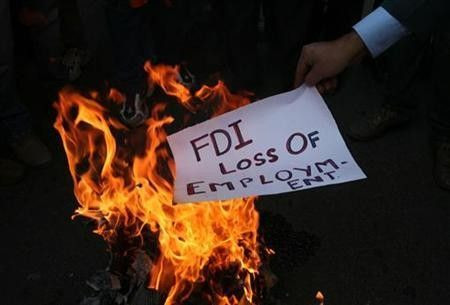India Retail: Nationalist MPs Say Wal-Mart's DC Lobbying Amounts To Bribery
They're targeting Wal-Mart's Washington-based trade advocacy. Wal-Mart fires back.

New rules allowing transnational multibrand retailers like Wal-Mart Stores Inc. (NYSE: WMT) to set up shop in some of India’s larger cities have been facing steep criticism from the conservative-nationalist Bharatiya Janata Party (BJP), India’s second-largest party.
Reeling from last week’s parliamentary vote of confidence supporting Prime Minister Manmohan Singh’s move to open up the country’s $450 billion, fast-growing retail market to foreign direct investment (FDI) by international big box retailers, opposition MPs pointed to recent Wal-Mart lobbying-disclosure filings on Capitol Hill they said proves the world’s largest retailer has bribed its way into the Subcontinent.
And even though such lobbying took place in Washington, D.C. – and was related to U.S. international trade policy – Indian opponents of FDI in retail say lobbying amounts to bribery, claiming the company has spent $25 million in Washington trying to open the way for expansion into India.
"I know [lobbying] is allowed in the U.S. But the laws of the two countries are different. Lobbying in the U.S. does not mean corruption, but in India, it does. That is the difference. There is illegality,” Yashwant Sinha, senior BJP member told the Times of India in a report published Monday.
The Bentonville, Ark.-based retailer behemoth quickly fired back.
“These allegations are entirely false. In accordance with U.S. law, U.S. companies are required to disclose the issues and expenditures associated with lobbying on a quarterly basis,” said an emailed statement from the company’s department of International Corporate Affairs in Bentonville, Ark., where the company is based. “Our Washington office naturally had discussions with U.S. government officials about a range of trade and investment issues that impact our businesses in the U.S. and worldwide and disclosed this in accordance with the law.”
It’s a touchy subject for Wal-Mart, which has faced allegations of market-access bribery in Mexico following a New York Times investigative report in April. The company announced in regulatory filings last month it had extended an internal inquiry into potential violations of the Foreign Corrupt Practices Act beyond Mexico to China, Brazil and India.
The investigations expanded late last year into a full-blown inquiry involving hundreds of lawyers, according to the Times. The company has cooperated with the U.S. Justice Department and the Securities and Exchange Commission, which are independently looking into the allegations. Last month several executives of Bharti Walmart Pvt. Ltd. – a 50-50 joint venture between Wal-Mart and commercial conglomerate Bharti Enterprises that operates wholesale clubs under the name Best Price Modern Wholesale – were suspended as part of Wal-Mart’s internal investigation.
But this latest controversy over lobbying appears to be political in nature. The issue came up during a routine parliamentary procedure on Monday, and opponents of FDI in Indian retail are demanding a statement from the prime minister and vowed to take up the subject on Tuesday. Parliamentary debates on the subject last week were nationally televised and involved shouting matches and walkouts by MPs. Some lawmakers boycotted voting on the subject, afraid to take a stand on the subject lest they face backlashes from their constituents.
But this latest controversy isn’t likely to have legs because it doesn't involve any allegations of bribery in India.
The issue is controversial because of the way Indian retail works. Consumers typically shop at individual owner-managed shops. The idea of big-box retail is relatively new to the country. Leftists and nationalists have united in opposition to the economic liberalization, saying it will destroy mom-and-pop outlets.
Under regulations passed by the federal government in Delhi in September, it’s up to the country’s 28 states and seven territories to decide whether to allow translational multibrand retail to operate in cities with more than 100,000 residents under partnership with Indian companies. The rules require retailers to source 30 percent of their merchandise in India and to invest in infrastructure development, such as the construction of cold-storage facilities for perishables.
So far, five of 28 Indian states and the capital New Delhi have approved allowing FDI in retail. Of them, Maharashtra, the western state with Mumbai as its capital, has 11 cities with more than 100,000 people and would likely be the starting point of entry.
© Copyright IBTimes 2024. All rights reserved.












